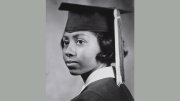Ruth J. Simmons, Ph.D. ’73, LL.D. ’02, grew up in Texas, the twelfth child of sharecroppers. With help from family members and caring teachers, she found a life in scholarship and the academy, becoming, in turn, provost at Spelman College, vice provost at Princeton, and president of Smith, Brown, and Prairie View A&M—and continues service as senior adviser to Harvard’s president on engaging with historically black colleges and universities. Her academic ascent involved both intellectual opportunities and life lessons from which anyone might learn. This excerpt from her memoir, Up Home: One Girl’s Journey (Random House, $27), concerns an eye-opening junior year at Wellesley (she was regularly enrolled at Dillard University in New Orleans), to which she traveled on her first airplane flight:
White Wellesley students had been chosen to help us get settled. Assigned to Stone Hall, I was placed on the hallway of an unambiguously congenial group of juniors who immediately came to my aid as I tried to adjust to this new environment….My new hall mates were friendly, but as I gradually came to understand the history associated with this preeminent Seven Sisters campus, I thought that Wellesley students might be too rich and elitist to befriend a person of my background. It was obvious that the other students on the hallway came from families of significant stature and means. Not knowing what this disparity in circumstances would mean, I was watchful for evidence of their scorn. The girls spoke excitedly of all the things I would be able to do during my year at Wellesley: travel, go into Boston to mixers at Harvard and MIT, ski, and so on. I knew that I would have difficulty managing such activities within my meager budget.
I had arrived in Massachusetts without proper clothing for the climate.…A local host family, the Browns, volunteered to offer me off-campus hospitality and assistance. Louise Brown, an Alabaman, was the friendliest and kindest adult white person I had met; she and her husband helped me solve my initial problems in understanding where to go for different needs and included me in their family gatherings.…Finding a transplanted southerner, who understood my background and whom I enjoyed more than the liberal northerners I met, was one of many surprises in my first encounter with the North. At the time, we tended to equate northerners with friendliness, concern, and solidarity with oppressed southern Blacks, and white southerners as uncompromisingly racist. Finding Mrs. Brown, with her thick southern accent, to be the antithesis of a racist shamed me into recognizing my responsibility to avoid relying on the same kinds of stereotypes that had so long imprisoned me and my family.…
I eventually found a job cleaning houses, and the additional money, along with small amounts from home, helped me afford a coat and pay for an occasional trip to HoJo’s (Howard Johnson’s restaurant) for fried clams. I thought about the fact that I was now cleaning houses as my mother had done under very different circumstances. Somehow, the fact that I was working in this way reassured me that I was not losing touch with my background, and I promised myself never to become so attached to this new life that I lost my appreciation for the history, culture, and people that had shaped me.









